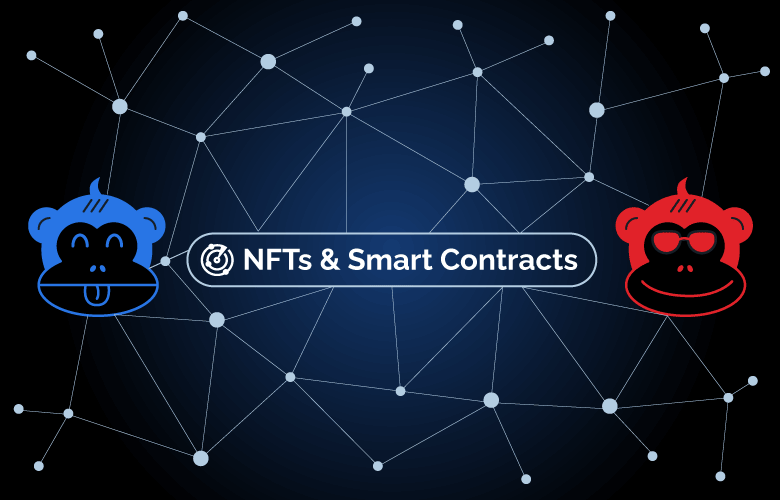July 20, 2021
Protect Your Cryptocurrency with a VPN
Research suggests that global crypto trading grew to 106 million users in January 2021, [...]

WHAT’S IN THIS REVIEW?
Disclaimer: Partnerships & affiliate links help us create better content. Learn how.
Why have NFTs become so popular, and what exactly are they? The digital tokens have made headlines recently due to a number of incredible sale prices, such as Beeple’s Everydays: The First 5,000 Days, which went for a record $69.3 million in March 2021.
Everyone from Eminem to The Pope has gotten in on the action, either advertising or offering a range of unique digital assets that are stored on the blockchain and often resold for massive profits.
However, despite dominating headlines, artwork and images are only one use case, as smart contracts could be the future of everything from voting to healthcare due to the benefits of a decentralized data system.
Here’s what you need to know about NFTs and smart contracts, from how it all works to current use-cases.
Let’s begin with the basics. An NFT, or non-fungible token, is a unique piece of digital data. (That’s what the “non-fungible” bit relates to, as it’s not replaceable by another identical item.)
These tokens are better known as NFTs, and they’re created by a process called minting, using a blockchain like Ethereum to do so. The minting process includes validating information, creating a new block, and recording that information into the blockchain.
For example, Ethereum is a well-known decentralized blockchain platform that forms the basis for many NFTs. (You’ll also be able to buy and mint NFTs on a number of other platforms, such as Solana and Cardano.)
Reproduction and the value of original assets have always been questionable, even for physical copies.
NFT collectibles are a burgeoning market, whether it be Bored Ape tokens that allow access to exclusive sites, unique digital cards featuring sporting stars, or pretty much anything in between. They can also sell for massive sums of money.
Take this recent sale for an Erling Haaland NFT. (Haaland is a soccer star, seen as one of the most promising players within the game.) The sale worked out to over $678,000, giving some indication of just how seriously NFTs are being taken by investors in a range of markets aside from traditional art.
Of course, as a digital asset, there’s nothing to stop someone from copying an image over to their own device with a click or two. (Reproduction and the value of original assets have always been questionable, even for physical copies.)
However, while it’s true that anyone can create a copy of many NFTs due to the nature of a digital asset, what investors are paying for is essentially a blockchain receipt, which confirms original ownership. After all, you won’t be selling a screenshot or a copy but rather ownership of the asset itself on the blockchain.
Ethereum has named a variety of potential uses for NFTs, which we’ve listed below.
The use-cases are endless, really. Arguably more versatile than money, NFTs can be anything in digital form. From concert tickets to Metaverse assets, NFTs provide a means to trade money or time for other commodities.
NFTs are minted via smart contracts. A smart contract stores code that is used to record information onto a blockchain. It uses a unique ID and metadata that can’t be replicated, which works to confirm ownership. As Ethereum explains:
“Smart contracts cannot be deleted by default, and interactions with them are irreversible.”
To make things a bit easier to understand, think of a smart contract as programming which is used to store data on a network like Ethereum. (In this case, it would be to store information relating to an NFT transaction.)
As well as storing the info, it can be accessed on the blockchain, ensuring transparency. A smart contract also helps to make buying or selling an NFT easier due to streamlined processes and fewer intermediaries.
After choosing your NFT artwork, minting involves selecting a blockchain and purchasing crypto to pay for the tokenization process. (Tokenization means transforming an asset into a digital token that can be moved, stored, and recorded on a blockchain.)
If you’re wondering where to buy NFTs, there are a number of NFT marketplaces that can be used to mint and sell NFTs, with OpenSea being a popular example.
If you lose access to your NFTs, you’re going to have a bad day. As an example, take the Todd Kramer phishing scam, where a cybercriminal “drained his Ethereum wallet of 15 NFTs valued at a total of $2.2 million, including four apes from the ‘Bored Ape Yacht Club’ collection.”
It’s a lot of trouble to attempt to recover assets that have been transferred to another user, so a smarter idea would be to improve overall online privacy and anonymity while using hard wallets and similar software.
You could also use a VPN to ensure that you remain anonymous while purchasing NFT assets. It’ll work to mask your location, and it’ll be more difficult for anyone who would potentially be interested in your investments to identify you.
Explore our list of the best VPNs for cryptocurrency trading to secure your connection today, before investing in anything digitally.
For example, with NordVPN you’ll be able to deploy Onion over VPN if you’d prefer to use the Tor network to buy and sell goods or services like NFTs. This is coupled with an airtight logging policy, an automatic kill switch, a DNS leak resolver, and many more features.
You should now have a better idea of what an NFT is, and how smart contracts work. Yet, do they really live up to the hype, or will they be another faddish footnote in tech history?
Here are some of the main pros and cons you can expect to find with NFTs and smart contracts.
At this moment in time, it’s tough to say whether NFTs represent the future of art and technology, as we’re still in a stage of infancy when it comes to development and implementation.
The sheer amount of money paid for some NFTs has seen increasing mainstream attention, but who knows whether the prices paid will be sustainable in the long run. The blockchain and smart contracts are potentially more interesting from a tech perspective, as we could all be using NFTs for anything from ticketing to business in the future.
There are numerous naysayers, but almost everyone has heard of NFTs, even if they don’t fully understand how they work or what they’re used for. Regardless, it’s worth keeping an eye on the NFT market, as long as you understand that the level of risk is much larger than you’ll find with traditional investments.
If you do decide to dabble in this new arena, consider first investing in a secure VPN that’ll give you the best shot of protecting your NFT.

WHAT’S IN THIS REVIEW?
| Cookie | Duration | Description |
|---|---|---|
| __cfduid | 1 month | The cookie is used by cdn services like CloudFlare to identify individual clients behind a shared IP address and apply security settings on a per-client basis. It does not correspond to any user ID in the web application and does not store any personally identifiable information. |
| cookielawinfo-checkbox-advertisement | 1 year | The cookie is set by GDPR cookie consent to record the user consent for the cookies in the category "Advertisement". |
| cookielawinfo-checkbox-analytics | 1 year | This cookies is set by GDPR Cookie Consent WordPress Plugin. The cookie is used to remember the user consent for the cookies under the category "Analytics". |
| cookielawinfo-checkbox-necessary | 1 year | This cookie is set by GDPR Cookie Consent plugin. The cookies is used to store the user consent for the cookies in the category "Necessary". |
| cookielawinfo-checkbox-non-necessary | 1 year | This cookie is set by GDPR Cookie Consent plugin. The cookies is used to store the user consent for the cookies in the category "Non-necessary". |
| cookielawinfo-checkbox-performance | 1 year | This cookie is set by GDPR Cookie Consent plugin. The cookie is used to store the user consent for the cookies in the category "Performance". |
| viewed_cookie_policy | 1 year | The cookie is set by the GDPR Cookie Consent plugin and is used to store whether or not user has consented to the use of cookies. It does not store any personal data. |
| Cookie | Duration | Description |
|---|---|---|
| cookielawinfo-checkbox-functional | 1 year | The cookie is set by GDPR cookie consent to record the user consent for the cookies in the category "Functional". |
| cookielawinfo-checkbox-others | 1 year | No description |